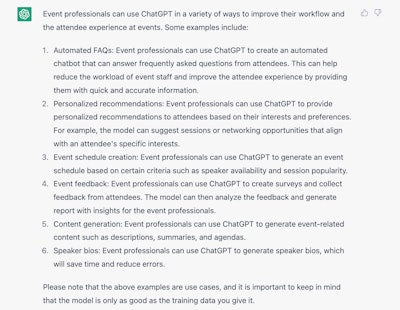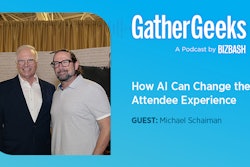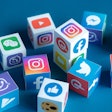
When drafting this story, we asked ChatGPT to write a headline about how it can help event professionals do their jobs. The initial result—ChatGPT Is the Ultimate Party Planner: Helping Event Professionals Rock Every Event!—was admittedly not the tone we were looking for. But despite its somewhat clumsy attempts at headline writing (and it did get better once we tweaked our prompt), the service is undeniably making an impact on the events industry.
ChatGPT, which stands for Chat Generative Pre-trained Transformer, is a free, experimental chatbot launched by artificial intelligence lab OpenAI in November 2022. Since then, the tool has drawn countless headlines—both positive and negative, with many pointing out concerns surrounding plagiarism, copyrights, job replacement, and more. But that didn't stop Microsoft from investing a whopping $10 billion in OpenAI earlier this week, with Microsoft CEO Satya Nadella calling AI “the next major wave of computing.”
Of course, artificial intelligence is nothing new to event professionals, who have been using AI-driven platforms and chatbots for things like matchmaking, content recommendations, translation, data analytics, and more for years. But the simplicity and accessibility of ChatGPT is drawing attention, and sparking conversations about the ways it can help event professionals do their jobs on a day-to-day basis.
To dip our toe into the conversation, we asked eight event experts to share their opinions on the technology. Here's what they had to say...
Nolan Ether, senior content marketing leader, Webex Events, North Carolina
I think tools like ChatGPT and other generative AI services present huge opportunities. The thing that makes ChatGPT such a game-changer is how simple the interface is. Spend 10 minutes on it, and you’ll get it. You can streamline workflows, generate content ideas and outlines, get to first drafts faster, increase personalization, and automate repetitive or low-complexity tasks. Our team has already found a number of ways to incorporate these tools into workflows, helping us improve efficiency and scale. I don’t think anyone can afford to ignore these tools. They give you superpowers. Just don’t abuse them. At the end of the day, our business is people, and if you lose the human element, the efficiency and scale won’t mean much.
Todd Moritz, vice president of technical solutions, Opus Digital Studio at Opus Agency, Oregon
It’s still early days, but there are definitely implications in the virtual event space in particular. Customer service and support is an obvious choice, but then you get into things like closed captioning and real-time translation for video streaming and you really start to see some potential—that already exists, but adding ChatGPT to the mix could just take things to a whole new level. Search is another place where ChatGPT could reference content across an event website and generate results based on conversational learning using those video transcripts and session abstracts. There’s a lot of talk right now about the negative implications for this tech, but in time (hopefully) we’ll start to see how it can be used to streamline workflows and do things we never really considered.
Michelle Nicole McNabb, owner and founder, Emenee Marketing 'n' Events, Pennsylvania
I’ve been having fun with ChatGPT, and overall it’s been a playground to sort through market research, cut through the noise, and format information into easy, consumable formats. It has been a great tool so far for brainstorming and generating initial concepts for content creation—it’s still only first draft material, but helps to accelerate and simplify messaging.
As far as consuming and organizing information, it’s a useful tool, but I don’t see it replacing competency and applied knowledge—especially in the event industry. It even responds that it doesn’t have access to the internet and can’t provide specific URLs. Even if tasks or responsibilities can be delegated, in any profession it takes experience to know what and who to ask and identify problems and set priorities. This helps bridge some of that gap, especially with entry- or junior-level to management and suppliers.
Like any other tool, it's intended to provide efficiencies but needs to be trained to be used most effectively. I believe teams that embrace tools such as ChatGPT and other AI will benefit by investing in how to incorporate them into their process and empower their teams—along with ethically integrating and discussing best practices and ownership. Help teams identify which capabilities to delegate to the tools, versus where we as humans with critical thinking should kick in.
Jen (Waak) Santos, founder & CEO, EventTech Academy, Brazil
I've been using it for a few different things: 1. Session title and abstract creation. In my use case, I'm building a training academy for event tech PMs, but it does a surprisingly good job with nice, hooky session titles. I think content leads should play with it by giving it a session title and then asking it to provide alternate titles. (Hint: you can also indicate tone, such as friendly, knowledgeable, sassy, etc.). 2. Poll and survey creation. Give it a topic and ask it to create a poll for you. 3. Testing names with audiences. I've been asking "act as if you are
Dylan Shinholser, event coordinator, 48/7 Live & Apex Entourage, Texas
I'm all in on AI, from writing copy to project management. I even use it to launch and optimize social media ads. Recently I have been playing with AI art as well, and as cool as it seems, it's got a ways to go before it's really useful to the average consumer. I've used Jasper for about a year and more recently ChatGPT. I use it to write copy to sell tickets, landing pages, event descriptions, sponsor outreach emails, social media posts, reminder emails for upcoming events, and whatever else I can. Two of my favorite use cases thus far have been using it to write objection rebuttals for when potential sponsors have said no, as well as having it write a $15,000 sponsor package out in full detail. I added in two additional perks that were unique to my event, and I was done. ChatGPT is just like anything else in life: You get out what you put in. Quality prompts are key. Adding adjectives, persona types, or asking the right things will yield better results.
Mimi Eayrs, chief operating officer & partner, JWP, New York
Overall, I'm excited about introducing AI into our work. I feel like it's an incredibly powerful tool that can allow us to increase our productivity so we can better focus on creating ideas and content and developing more meaningful relationships. Learning to use all tools, from AI to other technologies and resources, in order to optimize productivity and delegate certain automated tasks seems like a smarter way to work. As ChatGPT itself put it, "Upskilling and reskilling programs can help individuals transition to new roles in an increasingly technology-driven economy. It's important to proactively address the potential negative impacts of AI on employment while also embracing the many benefits it can bring."
As far as image generators like Dall-E or Midjourney, they are also powerful tools that combine the ways in which we use Pinterest, Photoshop, rendering engines, Procreate, and more. When putting together a mood board, for example, we often spend hours trying to find the right imagery that not only conveys the right style, but also a certain palette, vibe, and mood. Knowing what prompts to input in order to have AI generate that image you are thinking about is a great asset, but also one that also requires training and experience. I know there are many conversations surrounding intellectual property, which I think are valid and should always be had—in a world with and without AI. There is also a large responsibility in overseeing the work generated by AI. We will always need to apply analytical thinking, ethics, and a curatorial approach to ensure the output is faithful to what we are looking for, and ultimately take responsibility for supervising it.
I have only been using ChatGPT for two weeks, and I am already blown away by the increase in my productivity, inspiration, and creativity. Generating titles, topics, content, and copy for my events has been transformed from a tedious task to tons of fun! It's like having a super-powered writing assistant by my side, helping me turn my jumbled thoughts into coherent and comprehensive drafts in seconds.
Just for fun, we asked ChatGPT itself to answer our question too. Here's what it had to say...



















